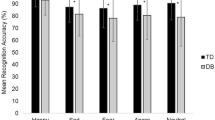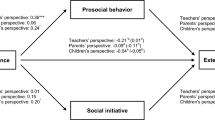Abstract
Piaget has demonstrated that socialization is accompanied by a reduction of egocentrism in development. It has also been found that the deficient socialization of the emotionally disturbed child is reflected in greater egocentric thought than in the nondisturbed child. This study was conducted to determine if performance on a Piagetian task would demonstrate differences in egocentric responses not only between disturbed and nondisturbed children, but if differences among three groups of disturbed children would be obtained as a function of treatment setting. It was found that the performance of the nondisturbed group was significantly less egocentric than that of all three groups of disturbed children. Further, the directionality of the results indicates that increasing egocentric performance is paralleled by severity of disturbance as defined by treatment setting. Implications for the interpersonal aspects of treatment programs are discussed.
Similar content being viewed by others
References
Flavell JH:The Developmental Psychology of Jean Piaget. New York, Van Nostrand, 1963.
Piaget J, Inhelder B:The Child's Conception of Space. London, Routledge & Kegan Paul, 1963.
Piaget J:The Moral Judgment of the Child. Glencoe, Ill, Free Press, 1960.
Neale JM: Egocentrism in institutionalized and non-institutionalized children.Child Dev 37:97–101, 1966.
Barber WH, Wessen A: Social interaction and severity of emotional disturbance.Amer J Orthopsychiat 34:56–63, 1964.
Bower E:Early Identification of Emotionally Handicapped Children in School. Springfield, Ill, Charles C Thomas, 1960.
Project Re-Ed:Project Re-Ed, a Demonstration Project for Re-Education of Emotionally Disturbed Children. Nashville, 1967.
Miller JW: Measuring perspective ability,J Geog 66:167–171, 1967.
Lewis WW: Educational intervention in emotional disturbance. In J Hellmuth Ed,Educational Therapy. Seattle, Special Child Publications, 1966.
Davids A: Personality and attitudes of child care workers, psychotherapists, and parents of children in residential treatment.Child Psychiat Hum Dev 1:41–49, 1970.
Author information
Authors and Affiliations
Additional information
This study was completed while the author was on a National Institute of Mental Health fellowship (1 TIMH 10561-01) at Peabody College. Gratitude is expressed to Nashville Metropolitan Schools, Tennessee Re-Education Schools, and Eastern State School and Hospital, Pennsylvania, for their cooperation.
Rights and permissions
About this article
Cite this article
Simeonsson, R.J. Egocentric responses of normal and emotionally disturbed children in different treatment settings. Child Psych Hum Dev 3, 179–186 (1972). https://doi.org/10.1007/BF01434944
Issue Date:
DOI: https://doi.org/10.1007/BF01434944




